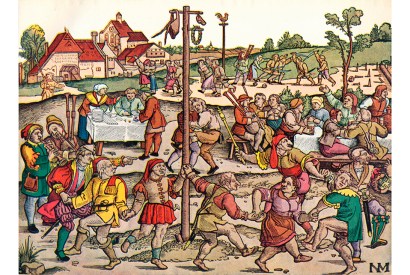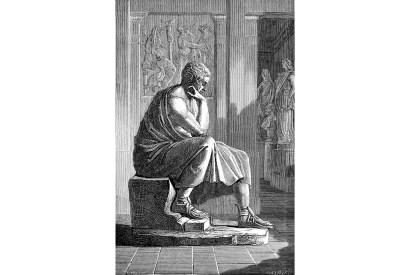Aristotle
Aristotle’s advice for young protestors
In his Art of Rhetoric, Aristotle (384-322 bc) sets about identifying the various headings under which you can be persuasive…
Were the Greeks right about justice?
The Sentencing Council, consisting of various legal authorities, has told judges and magistrates to consider, when sentencing the young, their…
Are we finally beginning to understand gravity?
Claudia de Rham explores the true nature of this fundamental force as she struggles against received wisdom to get a new theory of ‘massive gravity’ recognised
All work and no play is dulling our senses
Ancient Greek philosophers reckoned that life was all about free time, but 16th-century puritanism dealt a blow to the old festive culture from which we’ve never fully recovered
The balance of power between humans and machines
Robert Skidelsky dismisses the possibility of our annihilation by a superintelligent computer system, since ‘science tells us that we cannot create such a being’. But does it?
Circular arguments
Aristotle had long proved that the Earth was spherical, and even the illiterate masses of early medieval Europe were aware of the fact, says James Hannam
Liz Truss and the art of rhetoric
Liz Truss was spot-on in arguing that the only way in which a state can flourish is by combining low…
In search of the peripatetic philosopher Theophrastus
Publishers lately seem to have got the idea that otherwise uncommercial subjects might be rendered sexy if presented with a…
Does Putin pass Aristotle’s tyrant test?
Is Putin a tyrant? Aristotle (384-322 bc) might well have thought so. Seeing the turannos as a deviant type of…
America is a nation divided
New York Imagine a European country today in which a newspaper in its most populous city launches a mendacious project…
After a lifetime in nightclubs, now I party at home
New York It’s party time in the Bagel, and it’s about time, too. Good restaurants and elegant nightclubs are…
The great disrupter: how William of Occam overturned medieval thought
Astonishing where an idea can lead you. You start with something that 800 years hence will sound like it’s being…
Aristotle would have seen Trump’s behaviour as entirely normal
Donald Trump may be a narcissist, but since he is not mentally ill in the technical sense, he is not…
The ancients would have thought Boris was deluded
The gloom that envelopes the Labour party stands in strong contrast to the confidence and hope that the Prime Minister…
How to deal with Brexit anger, according to the ancients
Sir Philip Pullman, tweeting that thoughts of hanging the PM came to mind after the decision to prorogue parliament, later…
Do animals really have feelings? Plutarch thought so
Whatever the government decides about post-EU regulations on animal sentience, the Greek biographer and essayist Plutarch (died c. ad 120)…
Romans, racism and Sadiq Khan
‘Racism’ refers to the belief in racially determined inferiority, most often recognised in body-type, about which, by definition, nothing can…
Aphorisms and the arts: from Aristotle to Oscar Wilde
The author of this jam-packed treasure trove has been a film critic at the New York Times since 2000 and…
Ancient and Modern: The mercenaries of IS and ancient Greece
Last week we read that Isis was crumbling, but still a force to be reckoned with. That is true, but…
The question Christianity fails to answer: ‘Who is my neighbour?’
‘Fine old Christmas,’ wrote George Eliot, ‘with the snowy hair and ruddy face, had done his duty that year in…
How ancient Athens handled immigrants
Among all the arguments about how many non-EU immigrants we should let in, campaigners are proposing a scheme for private…
Aristotle wouldn't have rated Jeremy Corbyn’s fan club
Jeremy Corbyn says he is very excited about his campaign to become Labour leader because lots of young people are…



























